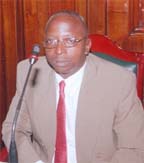The National Assembly on Thursday endorsed a motion by GAP/ROAR member Everall Franklin calling for police training to be intensified in the use of non-lethal weapons, but the support came with amendments and sharp words from the government benches.

Franklin, declaring himself a friend of the force, said the motion was not to weaken ranks of the Guyana Police Force but rather to offer them “options” to better serve the citizenry. He submitted that ranks must be equipped with the tools to constitutionally carry out their duties, arguing that non-lethal weapons could easily be used if available.
“Life is sacred,” Franklin and he suggested the use of non-lethal and less lethal weapons such as pepper spray, rubber projectiles and Tasers. However, the government benches rejected the Taser, calling it a dangerous weapon that had no place in the motion. Consequently, tasers were omitted following the amendments as submitted by Home Affairs Minister, Clement Rohee.
But in a pointed criticism of the force, Franklin said ranks with no training of how to use a weapon are roaming the streets armed, and he charged that persons of unsound mind are being shot dead in the country because the “police have no other options”. This comment prompted a response from the government benches that Franklin was assuming the role of the opposition leader. The PNCR was again absent from the assembly during the debate.
One of the resolved clauses calls of the motion called for the force to review its training programmes and assessments of ranks before issuing them with firearms taking into account the need for counselling and psychological programmes, and another clause called for the force to intensify its training programme in marksmanship for all ranks authorized to use firearms.

Flavour of the month
Speaking for the government, Rohee linked the motion with the recently released opposition parties’ dossier on human rights abuse saying that it was in keeping with the flavour of the month “to concoct a document” and present it. He said Franklin was casting a bad light on the force while seeking to gain some political mileage, adding that in its original state the motion was favourable to criminals. According to him, the rights of the victims are now on the backburners and the sexy thing to do is address the rights of the perpetrators.
PPP/C MP Gail Teixeira, in a fiery address during the debate, argued that the concept of the right to use legitimate force is not “cut and dry”. She insisted that the issue of reasonableness ought to be considered. Teixeira, a former home affairs minister, said that as soon as a policeman points a gun it is an issue to call foul, adding that officers are going to be caught in confrontations where a judgment has to be made and “where a person may get killed”. She rejected Franklin’s original motion saying it assumed local officers are not trained and are irresponsible and reckless.
She scolded Franklin saying it was absurd to present a situation that police are gunning down people “left, right and centre”. She continued, “I am not even dealing with that thing call a dossier,” and went on to say that the Guyana Human Rights Association went on record in 2003 stating that the rate of extra-judicial killings was higher between 1980 to 1992 than under the current regime. She said the majority of people arrested in the country are not shot; the majority of them taken before the courts were not abused and that persons who die in custody are a fraction “less than one per cent of all prisoners in this country”.
‘Men running around with AKs’
Later in her presentation Teixeira did deal with the dossier. She passionately declared that she is never going to forgive the crafters of the dossier for as long as she lives because, “in the dossier Minister Sash Sawh and his family are not included in those who were killed… but the concern in the dossier is about the two men who killed him!” She continued that the minister was assassinated and that the focus of the document is on defending the rights of the criminals.
“I am saying it publicly here, I will never, ever, as long as I live, forgive whoever wrote that document to have left out Minister Sash Sawh and his family who were executed!” As she spoke, a member of the government benches shouted, “Speak for me too”. There was no rebuttal from the opposition bench to this statement. However, a perusal of the dossier reveals that the minister, his relatives and a security guard who were killed in 2006 are listed under a section titled, ‘Full list of extra-judicial and other killings between 1993 and 2009’.
Teixeira said the police and the government were attacked as being incompetent and useless when people were being gunned down in 2002 and “men were running around with AKs”. Consequently, she said, civil society and the opposition called for the police to be better equipped to deal with the criminals. But this did not last long, Teixeira said, since, according to her, the death of Rondel ‘Fineman’ Rawlins was followed by demands for explanations.
Robert Persaud, who also contributed to the debate, argued that Franklin advanced the motion with some degree of genuine ignorance. He said Franklin appeared detached from the developments taking place within the system and the continuous efforts to reform the force. Persaud also contended that the motion creates the impression that non-lethal measures are not being considered by the law enforcement agencies adding, “this is far from reality”.
Persaud called for a comparison of non-lethal measures as instituted in other countries saying it is important to determine whether such measures actually reduce danger or death during police interventions. He quoted from a US Federal Bureau of Investigations bulletin which he said concluded based on a study that some methods of less lethal force and body restraint may increase the risk of death.
“We can cite instances of police misconduct and [say] law enforcement in retrospect could have done a better job and the way in which they were unprofessional we could go through that, [but] not that heap of garbage we saw in the form of a dossier,” Persaud said. According to him, the country can deal with specific cases within the force which have been raised. He said that members of his party have been victims of police brutality in the past. Further, he argued that the force must be not be made wimps and be ineffective in protecting the public.
The amended motion which was passed, essentially says that the assembly recognises the right of the force to use legitimate force within which the use of non-lethal weapons is an integral component of standard operational procedures and that in certain recent incidences the police have had little choice but to respond appropriately to protect themselves and citizens.







